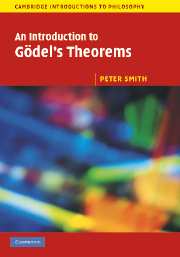Book contents
- Frontmatter
- Contents
- Preface
- 1 What Gödel's Theorems say
- 2 Decidability and enumerability
- 3 Axiomatized formal theories
- 4 Capturing numerical properties
- 5 The truths of arithmetic
- 6 Sufficiently strong arithmetics
- 7 Interlude: Taking stock
- 8 Two formalized arithmetics
- 9 What Q can prove
- 10 First-order Peano Arithmetic
- 11 Primitive recursive functions
- 12 Capturing p.r. functions
- 13 Q is p.r. adequate
- 14 Interlude: A very little about Principia
- 15 The arithmetization of syntax
- 16 PA is incomplete
- 17 Gödel's First Theorem
- 18 Interlude: About the First Theorem
- 19 Strengthening the First Theorem
- 20 The Diagonalization Lemma
- 21 Using the Diagonalization Lemma
- 22 Second-order arithmetics
- 23 Interlude: Incompleteness and Isaacson's conjecture
- 24 Gödel's Second Theorem for PA
- 25 The derivability conditions
- 26 Deriving the derivability conditions
- 27 Reflections
- 28 Interlude: About the Second Theorem
- 29 µ-Recursive functions
- 30 Undecidability and incompleteness
- 31 Turing machines
- 32 Turing machines and recursiveness
- 33 Halting problems
- 34 The Church–Turing Thesis
- 35 Proving the Thesis?
- 36 Looking back
- Further reading
- Bibliography
- Index
35 - Proving the Thesis?
Published online by Cambridge University Press: 05 June 2012
- Frontmatter
- Contents
- Preface
- 1 What Gödel's Theorems say
- 2 Decidability and enumerability
- 3 Axiomatized formal theories
- 4 Capturing numerical properties
- 5 The truths of arithmetic
- 6 Sufficiently strong arithmetics
- 7 Interlude: Taking stock
- 8 Two formalized arithmetics
- 9 What Q can prove
- 10 First-order Peano Arithmetic
- 11 Primitive recursive functions
- 12 Capturing p.r. functions
- 13 Q is p.r. adequate
- 14 Interlude: A very little about Principia
- 15 The arithmetization of syntax
- 16 PA is incomplete
- 17 Gödel's First Theorem
- 18 Interlude: About the First Theorem
- 19 Strengthening the First Theorem
- 20 The Diagonalization Lemma
- 21 Using the Diagonalization Lemma
- 22 Second-order arithmetics
- 23 Interlude: Incompleteness and Isaacson's conjecture
- 24 Gödel's Second Theorem for PA
- 25 The derivability conditions
- 26 Deriving the derivability conditions
- 27 Reflections
- 28 Interlude: About the Second Theorem
- 29 µ-Recursive functions
- 30 Undecidability and incompleteness
- 31 Turing machines
- 32 Turing machines and recursiveness
- 33 Halting problems
- 34 The Church–Turing Thesis
- 35 Proving the Thesis?
- 36 Looking back
- Further reading
- Bibliography
- Index
Summary
An algorithm, we said, is a sequential step-by-step procedure which can be fully specified in advance of being applied to any particular input. Every minimal step is to be ‘small’ in the sense that it is readily executable by a calculator with limited cognitive resources. The rules for moving from one step to the next must be entirely determinate and self-contained. And an algorithmic procedure is to deliver its output after a finite number of computational steps. The Church–Turing Thesis, as we are interpreting it, is then the claim that a numerical function is effectively computable by such an algorithm iff it is µ-recursive/ Turing-computable (note, we continue to focus throughout on total functions).
The Thesis, to repeat, is not a claim about what computing ‘machines’ can or can't do. Perhaps there can, at least in principle, be ‘machines’ that out-compute Turing machines – but if so, such hypercomputing set-ups will not be finitely executing algorithms (see Section 34.3).
And as we also stressed, it is enough for our wider purposes that we accept the Thesis's link between effective computability by an algorithm and µ-recursiveness/Turing computability; we don't have to take a particular stance on the status of the Thesis.
But all the same, it is very instructive to see how we might go about following Turing (and perhaps Gödel) in defending a bolder stance by trying to give an informal proof that the intuitive and formal concepts are indeed coextensive.
Information
- Type
- Chapter
- Information
- An Introduction to Gödel's Theorems , pp. 324 - 341Publisher: Cambridge University PressPrint publication year: 2007
